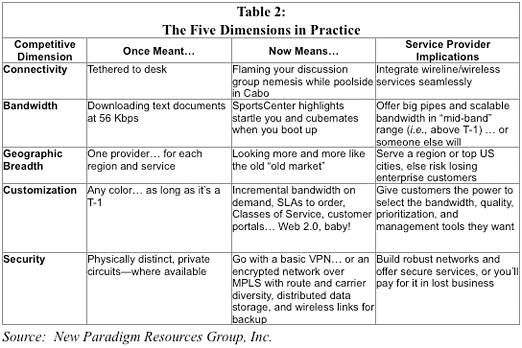|
|

article
page | 1
| 2
| 3
| 4 | 5 |
dollars in direct
theft and a similar amount of damage
to the mimicked companies’ brands
in the form of damaged customer relationships
and public image.
At the same time, communications networks have become increasingly mission-critical to all businesses. Transaction-based and financial institutions are obviously dependent on their systems, as are businesses with call centers (which are often distributed or offshored), suppliers and logistics companies that rely on EDI to communicate with customers, news and other content businesses, and even mom-and-pop eBay storefronts. Keeping a business’ network secure and available is as important to success as raw materials, building security and employee health. Public corporations and businesses facing legislative regulations, like the Sarbanes-Oxley Act and the Health Insurance Portability and Accountability Act (HIPAA), now require high levels of network security and data availability from their telecom partners.
For service providers,
network security and resiliency has
become a service differentiator and
a highly competitive service component.
IP-VPN services have enabled businesses
to cost-effectively
extend LAN/WAN access to small offices
and even telecommuters, a shift
from costlier frame relay and private
line networks. MPLS networks and
VLAN tagging on Metro Ethernet services
enable such secure networking functionality
further still. Similarly, following
the experience of man-made and natural
disasters, network resiliency strategies
have been a top
|
|
To succeed, providers have to scale up
their networks and add new services . . .
while simultaneously offering breakthrough
levels of fulfillment, customization,
and security. |

| priority for enterprise
and government customers. Services
and features like offsite backup,
route diversity, and emergency network
switchover to high-capacity fixed
wireless technology are no longer
luxuries.
Implications
For Service Providers
The telecommunications
market today is characterized by
increases in each of five dimensions:
increasing connectivity
to satisfy an always-on lifestyle;
growing bandwidth
to support new forms of content;
expanding geographic breadth
and scale to maximize the proportion
of services provisioned on-net and
persuade customers the network itself
is a value-add; more customization
of services to meet specific customer
needs; and improved security
that ensures data is protected and
the network is highly available.
To succeed, providers have to scale
up their networks and add new services,
such as wireless options, while
simultaneously offering breakthrough
levels of fulfillment, customization,
and security. It’s a tall
order, to be sure, but carriers
and their partners have raced forward
impressively in each of these dimensions
already this decade, and market
leaders are poised to continue that
success.
|
|
|
 |
| |
| |
article
page | 1 | 2 | 3 |
4 | 5 | |
|




